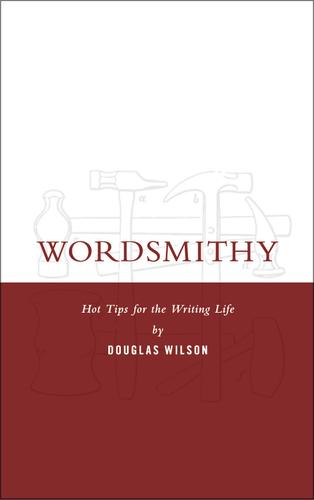Review: Wordsmithy

“Read. Read the kind of stuff you wish you could write…Tolkien said that his ideas sprang up from the leaf mold of his mind: your readings are the trees where your fallen leaves would come from. Mind mulch.”
If your goal is to be a great chef, you must first gather the ingredients and acquaint yourself with creatively combining those elements to create a tasty whole. To excel as a writer, you need a similarly diverse caisson of linguistic ammunition along with a focused work ethic for incremental improvement. This is the encompassing thesis of Wordsmithy: Hot Tips for the Writing Life from prolific author Douglas Wilson. Principally renowned for his work in Christian apologetics, Wilson has directed his pen toward aspiring writers of all genres and assembled a concise and witty distillate of his accumulated experience as a wordsmith. Easily digested in just a few hours and dense with serviceable wisdoms, this is without question one book every writer should add to his or her workshop.
The book rotates around a 7-point skeleton, which Wilson then unpacks in individual chapters:
- Know something about the world.
- Read. And constantly.
- Read mechanical helps.
- Stretch before your routines.
- Be at peace with being lousy for a while.
- Learn other languages.
- Keep a commonplace book.
Unlike many other instructionals of this variety, Wordsmithy is as enjoyable to read as it is useful. Along with the necessary preconditions for meritable writing, the book is decked with quotables and witty metaphors. An appetizer:
– “If you want to say a lot, have a lot to say.”
– “Interesting writers are interested writers.”
– “The point is not to read so widely that your voice will be a sort of mutt descended from them all.”
The pithiness and tangible analogy not only serve to make the book more digestible and difficult to put down, but makes the points easier to remember as you progress along your writing odyssey. Wilson is a writer’s writer, in the same vein as Wodehouse, Mencken, Chesterton, and C. S. Lewis, a few of his self-acknowledged influences. He understands what good writing is, and he has fun telling us how to get there.
Wilson is quick to point out that writing proficiency is not generally awarded by gift of genetics. While some people may be predisposed to the writer’s life, those people are likely not you and me. For the rest of us: “You are a wordsmith. Remember that you are in the smithy all day long.” He suggests plowing through dictionaries and etymological histories. He advises broad and variegated reading, both in genre and era. To contribute to the collage of quality writing, you must be conversant with the contributions of those artisans who have already made their mark.
Further, he recommends understanding not just the rules promulgated by grammarians, but understanding the internecine controversies brewing there as well. He endorses practicing with other literary forms, such as poetry, even Petrarchan sonnets and haikus. He urges to at least become fluid in another language, preferably one upstream of your native tongue. For English speakers, this means Latin, Greek, or Anglo-Saxon. Finally, he advocates anthologizing quotes, anecdotes and catchy turns of phrase you find along the way. “The writer’s life is a scavenger’s life,” Wilson tells us.
While I was pleasantly surprised that some of these items are already worked into my routine, I found several fragments of percipience here as well. One is the idea that conversations should be viewed as an opportunity to sharpen your writing voice and not the other way around. Even casual emails should be seized as events to iron out the wrinkles in your prose. Another is to engage full-steam in feedback, criticism and reviews of your work. While not all feedback will be constructive, it can often reveal whether your readers’ interpretation matches what you had intended to convey. Wilson also weighs in on the debate over whether language is a living organism, distinguishing between prescriptive and descriptive grammar and advising that a balance be struck between the two extremes. “Master the rules before you assume that you have the right to break them.”
One of the most useful of the exhortations found in the book involves authorship attribution. When borrowing short phrases such as metaphors or euphonic turns of phrase, a proper tip of the hat should be given to its architect, or your usage should be modified significantly from its first form. If its original utterer is unknown, general attribution is appropriate, such as “Somebody once said,” or “As the fellow said.” On the other hand, for common slang, or for phrasings used prolifically over the years, attribution is not entirely necessary, but a responsible nod might be advised if you are resurrecting a phrase which has fallen out of common usage. As Wilson puts it, “When I use that kind of expression, I am just keeping the ball in play.”
Another nice touch worth mentioning is the ‘recommended reading’ sections found at the close of each chapter. There are some first-rate recommendations here that I may not have found on my own. Wilson is also a certified Goodreads author and you can follow his many reviews there.
Closing Thoughts
In closing, I can’t recommend Wordsmithy enough. With an armada of other writing help books on the market, a recommendation doesn’t come lightly and this one might be pound for pound the most serviceable of them all, and easily the most cleverly written. Vigorous notetakers will likely find themselves marking up the book as much as reading it. Laconic, punchy, pitch perfect, and one hell of a joy to read, Wilson has manufactured the formula for what it takes to be a great writer and shipped it to us on a silver plate. Anyone looking to break new ground with their writing — from the inchoate freelance writer to the seasoned journalist — stands to benefit from this pragmatic collection of writerly wisdom. Just as great meals don’t happen by themselves, Wilson reveals why great writing must be preceded by an intimate familiarity with the various spices, flavors, tenors, and resonances that work toward that end.



Comments